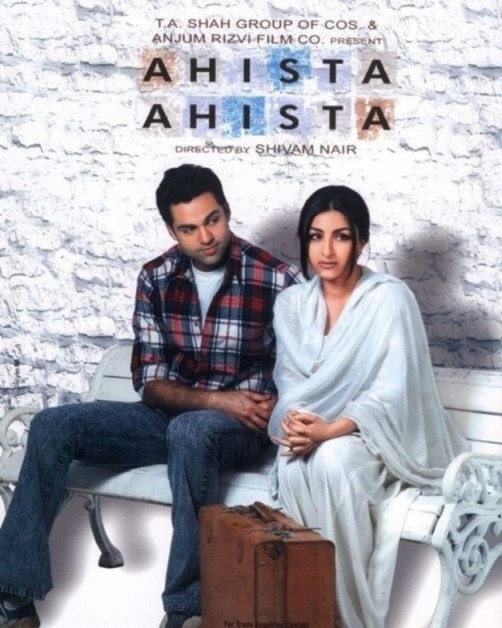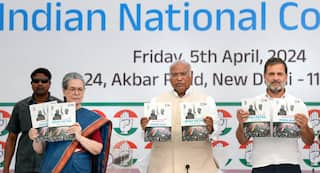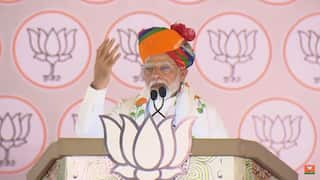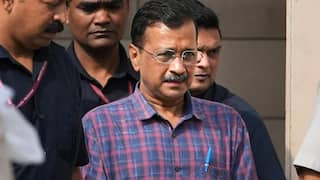Explorer
Advertisement

Ahista-Ahista

Among the many things that ‘new’ Bollywood traded nothing has hurt Hindi cinema as much as the loss of stillness in the narrative. One can barely think of a Hindi film in the recent past that had a sense of therav or holding on to something in a scene by means of shot-taking, blocking or even simple storytelling. Although now largely forgotten, Ahista-Ahista (2006), it’s lacklustre box-office run notwithstanding, seems to be ripe for a relook in the context of unrushed storytelling, something that just might be impossible for post-millennial commercial Hindi cinema to imagine.
A decade is hardly a long time by any stretch of the imagination, but the haste with which films stand forgotten in this day and age makes the eleven years since Ahista-Ahista released seem like another lifetime. In spite of the fact that it featured Abhay Deol, the then up and coming poster-boy of new, new Bollywood and was written by Imtiaz Ali, who, although still a year away from Jab We Met (2007), but a known name nonetheless post-Socha Na Tha (2005), Ahista-Ahista with it’s unusual storyline and the hero-heroine ‘not-meeting-ultimately’ end was probably doomed right from the beginning.
 On the face of it, the film seemed to be a thematically inspired by Fyodor Dostoevsky’s White Nights but Shivam Nair’s debut film also had a strong undercurrent of Guide (1965). Additionally, the film also rekindled F. Scott Fitzgerald’s The Great Gatsby in the way it explored the societal gender expectations especially from when looking at Megha, the female protagonist. Ankush (Abhay Deol) barely makes a living by acting as a witness for hire at Delhi’s marriage registrar and takes a shine to Megha (Soha Ali Khan), who has been ditched at the altar by Dheeraj (Shayan Munshi). Being non-judgmental, Ankush couldn’t care less about Megha’s decision that landed up in a soup and not only helps her get a place to stay but also aids in finding a meaning to her existence.
Having staked it all for Dheeraj, Megha realises that her own identity ceases to exist beyond being Dheeraj’s girlfriend. With time, she feels that Dheeraj leaving her was perhaps the best thing that happened to her. In the meantime, Ankush ponders over his life choices and finds that being a witness isn’t enough to repay the loan he had taken to support Megha. He starts working as a bank representative, and thanks to Megha, whom he’s now in love with, his life begins to get in order. Megha is indebted to Ankush enough for supporting her and although angry at him for taking a loan for her she can’t help but notice that things are looking up for both. She helps Ankush learn English in order to get a promotion at work and with time finally decides to let go of Dheeraj and her past.
As Megha embraces a future with Ankush, Dheeraj returns and starts searching for Megha. Looking at the possibility of his entire world crumbling down, Ankush uses all necessary means to dissuade Dheeraj. The day Ankush and Megha plan to marry Dheeraj shows up and wins Megha back by telling her why he couldn’t make it. Megha finds herself drawn to Dheeraj, the love of her life, and Ankush signs as a witness to their wedding but not without his standard fee.
The more stars began dominating Hindi cinema, the rarer slice of life films became and had Ahista-Ahista released between the mid-1970s and mid-1980s it might have possibly fared better. This was a period when middle cinema was readily accepted and wasn’t dependent on stars but more importantly the audience, too, was far more accepting of stars in such films. By the late 1980s, the baggage any popular stars brought to a project began to put undue pressure on the screenplay. While Ahista-Ahista barely had any baggage vis-à-vis the actors, it still suffered from an art-house tag and unfortunately, the two leads couldn’t completely shed their off-screen personas. The final act of the film where Ankush becomes desperate to win over Megha is not as convincing as the transition in Vijay A Guide where Raju (Dev Anand) does the same with Rosie (Waheeda Rahman). One reason could be that in Guide Raju’s discontentment with his lover is not driven as much by external factors than his own internal demons and maybe that is the reason why Raju’s disenchantment works better.
Sometimes the parts tend to be better than the sum of things and Ahista-Ahista is one such experience. It’s a film about dreams and aspirations and second chances that in a strange way is very Gatsby esque where like Jay Gatsby Ankush wants to wipe the class disparity between him and Megha, and she much like Daisy, is a victim of the roles ascribed by the society. The manner in which Megha chooses to be with Dheeraj leaves the viewer in a predicament – is her realisation of self identity or worth pointless then for she still can’t see beyond being Dheeraj’s wife, a role that killed her individuality? But more than anything else, in the end, Ahista-Ahista is about hopelessness winning and while poignantly captured the abject hopelessness might have been too much for the young viewers. Yet, the sheer stillness of the moment and the mood makes Ahista-Ahista worth watching.
Image- themoviedb.org
Gautam Chintamani is a film historian and the author of the best-selling Dark Star: The Loneliness of Being Rajesh Khanna (2014) and The Film That Revived Hindi Cinema (2016)
Tweet him – http://www.twitter.com/gchintamani
Cinema Obscura –
A weekly space that celebrates films obscured between the unforgettable and the long forgotten.
This article contains spoilers
Disclaimer: The opinions, beliefs and views expressed by the various authors and forum participants on this website are personal and do not reflect the opinions, beliefs and views of ABP News Network Pvt Ltd.
On the face of it, the film seemed to be a thematically inspired by Fyodor Dostoevsky’s White Nights but Shivam Nair’s debut film also had a strong undercurrent of Guide (1965). Additionally, the film also rekindled F. Scott Fitzgerald’s The Great Gatsby in the way it explored the societal gender expectations especially from when looking at Megha, the female protagonist. Ankush (Abhay Deol) barely makes a living by acting as a witness for hire at Delhi’s marriage registrar and takes a shine to Megha (Soha Ali Khan), who has been ditched at the altar by Dheeraj (Shayan Munshi). Being non-judgmental, Ankush couldn’t care less about Megha’s decision that landed up in a soup and not only helps her get a place to stay but also aids in finding a meaning to her existence.
Having staked it all for Dheeraj, Megha realises that her own identity ceases to exist beyond being Dheeraj’s girlfriend. With time, she feels that Dheeraj leaving her was perhaps the best thing that happened to her. In the meantime, Ankush ponders over his life choices and finds that being a witness isn’t enough to repay the loan he had taken to support Megha. He starts working as a bank representative, and thanks to Megha, whom he’s now in love with, his life begins to get in order. Megha is indebted to Ankush enough for supporting her and although angry at him for taking a loan for her she can’t help but notice that things are looking up for both. She helps Ankush learn English in order to get a promotion at work and with time finally decides to let go of Dheeraj and her past.
As Megha embraces a future with Ankush, Dheeraj returns and starts searching for Megha. Looking at the possibility of his entire world crumbling down, Ankush uses all necessary means to dissuade Dheeraj. The day Ankush and Megha plan to marry Dheeraj shows up and wins Megha back by telling her why he couldn’t make it. Megha finds herself drawn to Dheeraj, the love of her life, and Ankush signs as a witness to their wedding but not without his standard fee.
The more stars began dominating Hindi cinema, the rarer slice of life films became and had Ahista-Ahista released between the mid-1970s and mid-1980s it might have possibly fared better. This was a period when middle cinema was readily accepted and wasn’t dependent on stars but more importantly the audience, too, was far more accepting of stars in such films. By the late 1980s, the baggage any popular stars brought to a project began to put undue pressure on the screenplay. While Ahista-Ahista barely had any baggage vis-à-vis the actors, it still suffered from an art-house tag and unfortunately, the two leads couldn’t completely shed their off-screen personas. The final act of the film where Ankush becomes desperate to win over Megha is not as convincing as the transition in Vijay A Guide where Raju (Dev Anand) does the same with Rosie (Waheeda Rahman). One reason could be that in Guide Raju’s discontentment with his lover is not driven as much by external factors than his own internal demons and maybe that is the reason why Raju’s disenchantment works better.
Sometimes the parts tend to be better than the sum of things and Ahista-Ahista is one such experience. It’s a film about dreams and aspirations and second chances that in a strange way is very Gatsby esque where like Jay Gatsby Ankush wants to wipe the class disparity between him and Megha, and she much like Daisy, is a victim of the roles ascribed by the society. The manner in which Megha chooses to be with Dheeraj leaves the viewer in a predicament – is her realisation of self identity or worth pointless then for she still can’t see beyond being Dheeraj’s wife, a role that killed her individuality? But more than anything else, in the end, Ahista-Ahista is about hopelessness winning and while poignantly captured the abject hopelessness might have been too much for the young viewers. Yet, the sheer stillness of the moment and the mood makes Ahista-Ahista worth watching.
Image- themoviedb.org
Gautam Chintamani is a film historian and the author of the best-selling Dark Star: The Loneliness of Being Rajesh Khanna (2014) and The Film That Revived Hindi Cinema (2016)
Tweet him – http://www.twitter.com/gchintamani
Cinema Obscura –
A weekly space that celebrates films obscured between the unforgettable and the long forgotten.
This article contains spoilers
Disclaimer: The opinions, beliefs and views expressed by the various authors and forum participants on this website are personal and do not reflect the opinions, beliefs and views of ABP News Network Pvt Ltd.
 On the face of it, the film seemed to be a thematically inspired by Fyodor Dostoevsky’s White Nights but Shivam Nair’s debut film also had a strong undercurrent of Guide (1965). Additionally, the film also rekindled F. Scott Fitzgerald’s The Great Gatsby in the way it explored the societal gender expectations especially from when looking at Megha, the female protagonist. Ankush (Abhay Deol) barely makes a living by acting as a witness for hire at Delhi’s marriage registrar and takes a shine to Megha (Soha Ali Khan), who has been ditched at the altar by Dheeraj (Shayan Munshi). Being non-judgmental, Ankush couldn’t care less about Megha’s decision that landed up in a soup and not only helps her get a place to stay but also aids in finding a meaning to her existence.
Having staked it all for Dheeraj, Megha realises that her own identity ceases to exist beyond being Dheeraj’s girlfriend. With time, she feels that Dheeraj leaving her was perhaps the best thing that happened to her. In the meantime, Ankush ponders over his life choices and finds that being a witness isn’t enough to repay the loan he had taken to support Megha. He starts working as a bank representative, and thanks to Megha, whom he’s now in love with, his life begins to get in order. Megha is indebted to Ankush enough for supporting her and although angry at him for taking a loan for her she can’t help but notice that things are looking up for both. She helps Ankush learn English in order to get a promotion at work and with time finally decides to let go of Dheeraj and her past.
As Megha embraces a future with Ankush, Dheeraj returns and starts searching for Megha. Looking at the possibility of his entire world crumbling down, Ankush uses all necessary means to dissuade Dheeraj. The day Ankush and Megha plan to marry Dheeraj shows up and wins Megha back by telling her why he couldn’t make it. Megha finds herself drawn to Dheeraj, the love of her life, and Ankush signs as a witness to their wedding but not without his standard fee.
The more stars began dominating Hindi cinema, the rarer slice of life films became and had Ahista-Ahista released between the mid-1970s and mid-1980s it might have possibly fared better. This was a period when middle cinema was readily accepted and wasn’t dependent on stars but more importantly the audience, too, was far more accepting of stars in such films. By the late 1980s, the baggage any popular stars brought to a project began to put undue pressure on the screenplay. While Ahista-Ahista barely had any baggage vis-à-vis the actors, it still suffered from an art-house tag and unfortunately, the two leads couldn’t completely shed their off-screen personas. The final act of the film where Ankush becomes desperate to win over Megha is not as convincing as the transition in Vijay A Guide where Raju (Dev Anand) does the same with Rosie (Waheeda Rahman). One reason could be that in Guide Raju’s discontentment with his lover is not driven as much by external factors than his own internal demons and maybe that is the reason why Raju’s disenchantment works better.
Sometimes the parts tend to be better than the sum of things and Ahista-Ahista is one such experience. It’s a film about dreams and aspirations and second chances that in a strange way is very Gatsby esque where like Jay Gatsby Ankush wants to wipe the class disparity between him and Megha, and she much like Daisy, is a victim of the roles ascribed by the society. The manner in which Megha chooses to be with Dheeraj leaves the viewer in a predicament – is her realisation of self identity or worth pointless then for she still can’t see beyond being Dheeraj’s wife, a role that killed her individuality? But more than anything else, in the end, Ahista-Ahista is about hopelessness winning and while poignantly captured the abject hopelessness might have been too much for the young viewers. Yet, the sheer stillness of the moment and the mood makes Ahista-Ahista worth watching.
Image- themoviedb.org
Gautam Chintamani is a film historian and the author of the best-selling Dark Star: The Loneliness of Being Rajesh Khanna (2014) and The Film That Revived Hindi Cinema (2016)
Tweet him – http://www.twitter.com/gchintamani
Cinema Obscura –
A weekly space that celebrates films obscured between the unforgettable and the long forgotten.
This article contains spoilers
Disclaimer: The opinions, beliefs and views expressed by the various authors and forum participants on this website are personal and do not reflect the opinions, beliefs and views of ABP News Network Pvt Ltd.
On the face of it, the film seemed to be a thematically inspired by Fyodor Dostoevsky’s White Nights but Shivam Nair’s debut film also had a strong undercurrent of Guide (1965). Additionally, the film also rekindled F. Scott Fitzgerald’s The Great Gatsby in the way it explored the societal gender expectations especially from when looking at Megha, the female protagonist. Ankush (Abhay Deol) barely makes a living by acting as a witness for hire at Delhi’s marriage registrar and takes a shine to Megha (Soha Ali Khan), who has been ditched at the altar by Dheeraj (Shayan Munshi). Being non-judgmental, Ankush couldn’t care less about Megha’s decision that landed up in a soup and not only helps her get a place to stay but also aids in finding a meaning to her existence.
Having staked it all for Dheeraj, Megha realises that her own identity ceases to exist beyond being Dheeraj’s girlfriend. With time, she feels that Dheeraj leaving her was perhaps the best thing that happened to her. In the meantime, Ankush ponders over his life choices and finds that being a witness isn’t enough to repay the loan he had taken to support Megha. He starts working as a bank representative, and thanks to Megha, whom he’s now in love with, his life begins to get in order. Megha is indebted to Ankush enough for supporting her and although angry at him for taking a loan for her she can’t help but notice that things are looking up for both. She helps Ankush learn English in order to get a promotion at work and with time finally decides to let go of Dheeraj and her past.
As Megha embraces a future with Ankush, Dheeraj returns and starts searching for Megha. Looking at the possibility of his entire world crumbling down, Ankush uses all necessary means to dissuade Dheeraj. The day Ankush and Megha plan to marry Dheeraj shows up and wins Megha back by telling her why he couldn’t make it. Megha finds herself drawn to Dheeraj, the love of her life, and Ankush signs as a witness to their wedding but not without his standard fee.
The more stars began dominating Hindi cinema, the rarer slice of life films became and had Ahista-Ahista released between the mid-1970s and mid-1980s it might have possibly fared better. This was a period when middle cinema was readily accepted and wasn’t dependent on stars but more importantly the audience, too, was far more accepting of stars in such films. By the late 1980s, the baggage any popular stars brought to a project began to put undue pressure on the screenplay. While Ahista-Ahista barely had any baggage vis-à-vis the actors, it still suffered from an art-house tag and unfortunately, the two leads couldn’t completely shed their off-screen personas. The final act of the film where Ankush becomes desperate to win over Megha is not as convincing as the transition in Vijay A Guide where Raju (Dev Anand) does the same with Rosie (Waheeda Rahman). One reason could be that in Guide Raju’s discontentment with his lover is not driven as much by external factors than his own internal demons and maybe that is the reason why Raju’s disenchantment works better.
Sometimes the parts tend to be better than the sum of things and Ahista-Ahista is one such experience. It’s a film about dreams and aspirations and second chances that in a strange way is very Gatsby esque where like Jay Gatsby Ankush wants to wipe the class disparity between him and Megha, and she much like Daisy, is a victim of the roles ascribed by the society. The manner in which Megha chooses to be with Dheeraj leaves the viewer in a predicament – is her realisation of self identity or worth pointless then for she still can’t see beyond being Dheeraj’s wife, a role that killed her individuality? But more than anything else, in the end, Ahista-Ahista is about hopelessness winning and while poignantly captured the abject hopelessness might have been too much for the young viewers. Yet, the sheer stillness of the moment and the mood makes Ahista-Ahista worth watching.
Image- themoviedb.org
Gautam Chintamani is a film historian and the author of the best-selling Dark Star: The Loneliness of Being Rajesh Khanna (2014) and The Film That Revived Hindi Cinema (2016)
Tweet him – http://www.twitter.com/gchintamani
Cinema Obscura –
A weekly space that celebrates films obscured between the unforgettable and the long forgotten.
This article contains spoilers
Disclaimer: The opinions, beliefs and views expressed by the various authors and forum participants on this website are personal and do not reflect the opinions, beliefs and views of ABP News Network Pvt Ltd.
Follow Blog News on abp LIVE for more latest stories and trending topics. Watch breaking news and top headlines online on abp News LIVE TV
View More
Advertisement
Advertisement
Advertisement
Advertisement
Trending News

for smartphones
and tablets
and tablets

Anand Kochukudy
Opinion


























